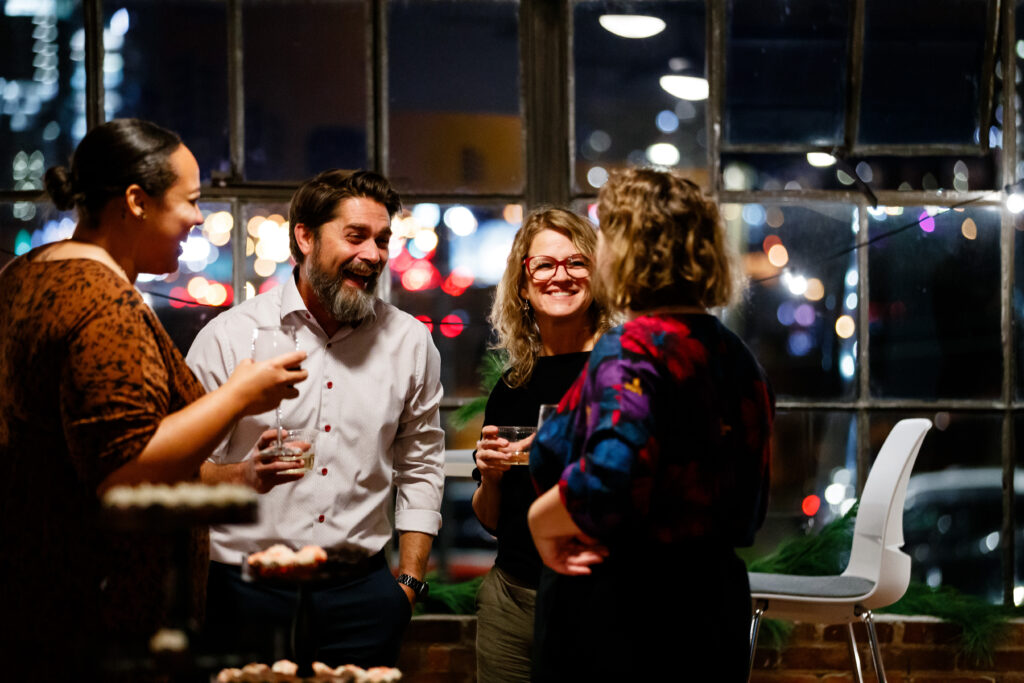The following is an excerpt of information shared with our UGL Volunteers, which aims to educate them on the importance of thinking about sustainability during the holidays. This information was compiled by our Sustainable Households Manager, Karissa Hampton. To learn more about the UGL Volunteers, click here.
As the holiday season approaches, it’s a time for festivities, family, and celebration. But it’s also a time when waste, energy consumption, and carbon emissions rise significantly. From Halloween through New Year’s, our choices can have a lasting impact on the environment. These next couple of months, we’ll explore ways to sustainably celebrate the holidays—from reducing food waste and energy consumption to making smarter choices about travel and decorations. Let’s savor the season while making it joyful and sustainable for everyone!
Did You Know?
- Festivities
- More than one billion pounds of pumpkins are grown in the U.S. every fall. After being used for decorations, pies, and jack-o-lanterns, millions of these pumpkins end up in landfills, where they decompose and release harmful gasses. Wasting pumpkins also means wasting the water, energy, and labor used to grow them. Alongside wasted food, millions of pounds of candy wrappers and single-use costumes add to the growing waste problem. (Source)
- Travel
- Over 100 million people in the U.S. travel during the holiday season to see their loved ones. Whether hitting the road in a car full of gifts for family or catching a flight back home, this causes a big jump in carbon emissions. (Source) Plus, with all the online shopping, the shipping process increases waste and packaging pollution, adding to the holiday footprint.
- Energy
- It’s estimated that each household, on average, will use 65 kWh of electricity to power their holiday lights throughout December. This holiday season, festive lights, cozy heating, and extra appliance use can significantly increase your electricity consumption. Shorter, darker days mean more time indoors, and traditional holiday lights use a lot more energy, leading to a rise in greenhouse gas emissions. (Source)
Actionable Steps You Can Take
- Minimize Holiday Waste
- Plan your Meals: Plan your holiday meals carefully by using this “Guestimator” to avoid waste or try using leftovers in recipes like soups and pies.
- Compost your Pumpkins: Instead of throwing away pumpkins, compost them to add nutrients back into your soil. Try composting in your backyard, using a curbside service, or locating Nashville’s Convenience Centers.
- Reduce Travel Impacts
- Choose Greener Travel Options: When possible, opt for carpooling, taking trains or buses, or choosing direct flights to significantly reduce your carbon footprint.
- Plan Eco-Friendly Road Trips: If you're driving, make your journey more efficient by ensuring your vehicle is well-maintained, combining trips, and avoiding heavy traffic when possible.
- Support Local and Sustainable Businesses: Shop locally and/or support businesses that prioritize sustainability.
- Save Energy
- Switch to LED Lights: If possible, replace your household light bulbs and traditional holiday lights with energy-efficient LED lights or solar panel string lights.
- Use Timers and Smart Controls: Install timers or smart plugs to automatically turn off your lights and holiday decorations when they’re not needed.
- Optimize Heating: If your comfort allows, adjust your thermostat to a lower, more efficient temperature, and use programmable thermostats to better manage heating needs.
- Embrace Natural Light: Make the most of shorter daylight hours by opening curtains or blinds during the day to let in natural light and help heat your space naturally.
Keep Learning
Let’s continue to learn, share, and discuss key resources to celebrate the holidays more sustainably.
- Discover more about sustainable holidays
For access to more sustainability education and resources, join the UGL Volunteers!
Karissa Hampton serves as the Sustainable Households Manager with Urban Green Lab. She leads the Households division in strategically teaching Nashville families and individuals to find simple, sustainable solutions within their own homes. Karissa also helps with our new UGL Volunteers program and Community Engagement as a resource to bring together a “green team” of diverse volunteers and residents.
